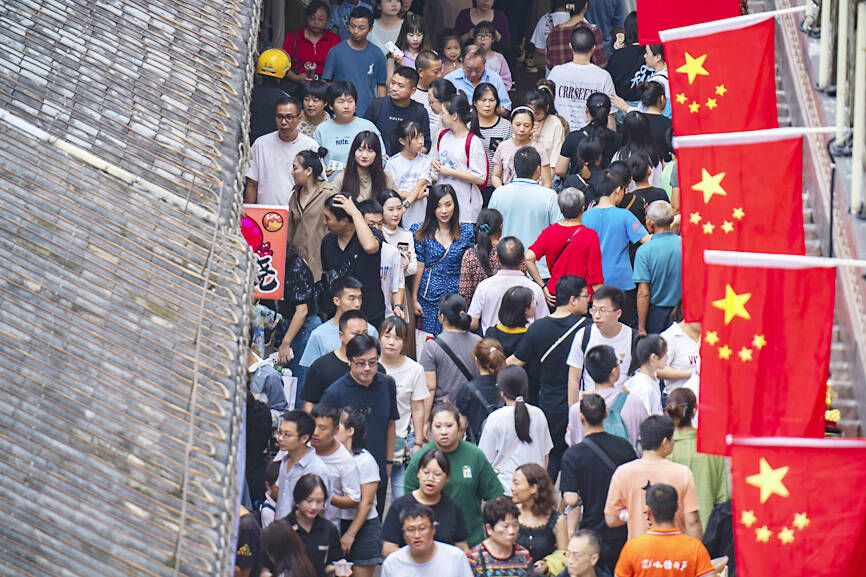The Ciaotou Prosecutors’ Office in Kaohsiung yesterday released two suspects on bail who have been accused of recruiting Taiwanese to join tours to China funded by Beijing and in which they were urged to vote for pan-blue candidates in January’s presidential and legislative elections.
The pan-blue camp generally refers to the Chinese Nationalist Party (KMT), the People First Party, the New Party and the Young China Party, which support closer relations with China.
Prosecutors said that a man, surnamed Cheng (鄭), and a woman, surnamed Yeh (葉), who are members of the China Pan-Blue Association, recruited Taiwanese tourists to join tours arranged and funded entirely by China’s Taiwan Affairs Office (TAO) from May to last month.

Photo: AP
An investigation found that the two had helped arrange five tours to China, with TAO representatives accompanying the visitors throughout the trip. The five destinations were: Shandong Province from May 7 to 14; Shanxi Province from June 24 to July 2; Inner Mongolia from Aug. 3 to 13; Xinjiang Province from Sept. 4 to 18; and Henan Province from Oct. 19 to 28, prosecutors said.
About 130 Taiwanese participated in the tours, including six current and former borough wardens, prosecutors said.
During the trips, visitors met with representatives from the TAO and China’s United Front Work Department, who urged them to vote for pan-blue candidates to remove the Democratic Progressive Party government from office, they said.
“TAO representatives used these meetings to ask the visitors about their political inclinations and express the wish that they would support cooperation between the pan-blue camp and the Taiwan People’s Party or a specific presidential candidate. Cheng also helped amplify their agenda on the sidelines,” prosecutors said.
The visitors were also told to support cross-strait peace and the so-called “1992 consensus,” and to oppose Taiwanese independence.
The “1992 consensus” — a term that former Mainland Affairs Council chairman Su Chi (蘇起) in 2006 admitted making up in 2000 — refers to a tacit understanding between the KMT and the Chinese Communist Party (CCP) that both sides of the Taiwan Strait acknowledge there is “one China,” with each side having its own interpretation of what “China” means.
The prosecutors’ office formed a six-member team and summoned Cheng, Yeh and 20 others for investigation.
Prosecutors said that Cheng and Yeh are suspected of contravening the Anti-Infiltration Act (反滲透法), the Presidential and Vice Presidential Election and Recall Act (總統副總統選舉罷免法) and the Public Officials Election and Recall Act (公職人員選舉罷免法).
The two were released on bail of NT$150,000 and NT$50,000 respectively, and were restricted from leaving the country.
Aside from treating Taiwanese tourists to free tours to China, Taiwanese security officials have identified other ways that Beijing uses to interfere in Taiwan’s elections, such as deploying artificial intelligence to disseminate misinformation and inviting political commentators and heads of polling firms to attend forums in China.

A magnitude 7.0 earthquake struck off Yilan at 11:05pm yesterday, the Central Weather Administration (CWA) said. The epicenter was located at sea, about 32.3km east of Yilan County Hall, at a depth of 72.8km, CWA data showed There were no immediate reports of damage. The intensity of the quake, which gauges the actual effect of a seismic event, measured 4 in Yilan County area on Taiwan’s seven-tier intensity scale, the data showed. It measured 4 in other parts of eastern, northern and central Taiwan as well as Tainan, and 3 in Kaohsiung and Pingtung County, and 2 in Lienchiang and Penghu counties and 1

A car bomb killed a senior Russian general in southern Moscow yesterday morning, the latest high-profile army figure to be blown up in a blast that came just hours after Russian and Ukrainian delegates held separate talks in Miami on a plan to end the war. Kyiv has not commented on the incident, but Russian investigators said they were probing whether the blast was “linked” to “Ukrainian special forces.” The attack was similar to other assassinations of generals and pro-war figures that have either been claimed, or are widely believed to have been orchestrated, by Ukraine. Russian Lieutenant General Fanil Sarvarov, 56, head

FOREIGN INTERFERENCE: Beijing would likely intensify public opinion warfare in next year’s local elections to prevent Lai from getting re-elected, the ‘Yomiuri Shimbun’ said Internal documents from a Chinese artificial intelligence (AI) company indicated that China has been using the technology to intervene in foreign elections, including propaganda targeting Taiwan’s local elections next year and presidential elections in 2028, a Japanese newspaper reported yesterday. The Institute of National Security of Vanderbilt University obtained nearly 400 pages of documents from GoLaxy, a company with ties to the Chinese government, and found evidence that it had apparently deployed sophisticated, AI-driven propaganda campaigns in Hong Kong and Taiwan to shape public opinion, the Yomiuri Shimbun reported. GoLaxy provides insights, situation analysis and public opinion-shaping technology by conducting network surveillance

‘POLITICAL GAME’: DPP lawmakers said the motion would not meet the legislative threshold needed, and accused the KMT and the TPP of trivializing the Constitution The Legislative Yuan yesterday approved a motion to initiate impeachment proceedings against President William Lai (賴清德), saying he had undermined Taiwan’s constitutional order and democracy. The motion was approved 61-50 by lawmakers from the main opposition Chinese Nationalist Party (KMT) and the smaller Taiwan People’s Party (TPP), who together hold a legislative majority. Under the motion, a roll call vote for impeachment would be held on May 19 next year, after various hearings are held and Lai is given the chance to defend himself. The move came after Lai on Monday last week did not promulgate an amendment passed by the legislature that